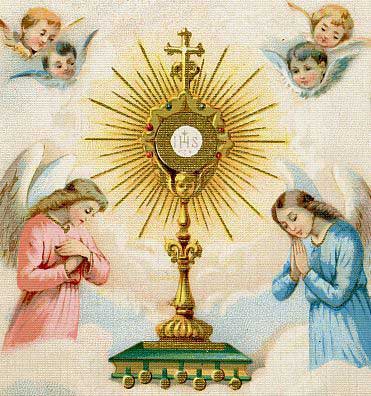|
|
|
|
Ave Maria Meditations
A Eucharistic Meditation from St. Peter Julian Eymard (feast day is August 2nd) on the Blessed Sacrament THE EXCESS OF LOVE WHAT shall we say of the Eucharistic abasement of our Lord Jesus Christ? To remain with us Jesus Christ exposes Himself to ingratitude and insult. Nothing disheartens Him. Let us contemplate this good Savior Whom we ill-treat as we would no one else, and Who nevertheless persists in remaining with us. I Our Lord certainly deserves our gratitude for coming to us and bringing us infinite treasure of grace. After all, He is king; He is God! What poor or sick man could receive the visit of a grandee of this world, especially of a king, without being moved to gratitude for such condescension? Envy, and even hatred, yields to the greatness that abases itself. Does not our Lord deserve to thanked and loved? For He does not visit us only in passing; He remains in our midst. Whether we ask for Him or not, He is there to do us good even without our desiring it. He is the only one not to be thanked for the good He does. Through His presence in the most Blessed Sacrament He works wonders of charity but they are not appreciated; they are not even considered. Men consider it a disgrace to be ungrateful; but with regard to our Lord one would think ingratitude were a commandment. And all this did not dishearten our Lord; He knew it all when He instituted the Eucharist. He had but one thought: Deliciae meae, “My delights are to be with the children of the wretched.” Love reaches a point where it is so strong that it wants to be with those it loves, even with no hope of return. II Our Lord seems to seek outrages. He does not take care of His honor. It is frightful to think of it. Ah! How terrified we will be on the day of judgment for having lived with so much love at our side and paid no heed to it! Our Lord, in fact, comes without pomp or majesty. Upon the altar, beneath the Eucharistic veil our Lord looks like a nondescript that has no longer any being. Is there need of greater self-abasement? In order to abase Himself thus, our Lord has to display all His power. He sustains the accidents by a miracle. He contradicts all the laws of nature in order to humble and abase Himself. Who could envelop the sun in a cloud thick enough to intercept its light and heat? That would be a very great miracle. Our Lord performs it in His own Person beneath the Eucharistic Species, which in themselves are so frail and common, He is glorious and luminous; He is God… Oh! Let us not put our Lord to shame for His being so lowly and little! His love has willed it! III Our Lord could have a whole retinue of visible and armed angels for His protection, but He is unwilling to have it: these angelic armies would frighten us or humiliate us with their faith and their respect. Our Lord comes alone and abandoned in order to abase Himself the more. Love never ceases condescending to the one loved. IV Our Lord denies Himself personal glory in the Most Blessed Sacrament. He veils His beautiful countenance. He imposes silence on His divine lips, the lips of the Word, because these things would bring Him honors and would place Him too far above us. He wants to come down to our level. Oh! Let us then respect the lowliness of Jesus Christ in the Eucharist. V Our Lord gives Himself without any defense whatever. He loses His own power of action. No longer can He complain or flee or call for help. He has forbidden His angels to help Him or to punish those who insult Him. We instinctively run to help one who is being attacked or is in danger; but no one will help our Lord. He is Man and He is God; but He retains only the power to love and to abase Himself. VI But, Lord, why dost Thou do this? Why this excess? (Jesus replies): “I love them; I see them; I am waiting for them; I am coming to them; My delights are to be with the wretched.” In the meantime people attend to their pleasures, their ambitions, their friends, their business; to everything before our Lord. He is the last to be attended to, perhaps by way of Viaticum-if there is time for it-is not that enough? Lord, why dost Thou come to those who do not care for Thee? Why dost Thou insist on remaining with those who reject Thee? VII Who would agree to do what our Lord does: He institutes His Sacrament to be honored therein by man, and He is more insulted than honored; the bad Christians outnumber the good. Our Lord is taking in only losses. Why does He keep up this business? Who would want to run a business at a total loss? Ah, the Saints who see and understand so much love and abasement must be seized with a holy anger and feel indignant at seeing us so ungrateful! And the Father says to His Son, “We must put a stop to this; You are getting nothing out of it. Your love is lighted; Your abasements are made nothing of. You are losing out of it; let us be done with it!” But Our Lord will not listen. He stays on; He hopes, He contents Himself with the adoration and love of a few good souls. Oh! We at least, let us not fail Him. Does he not deserve by His abasements that we honor and love Him?
|

